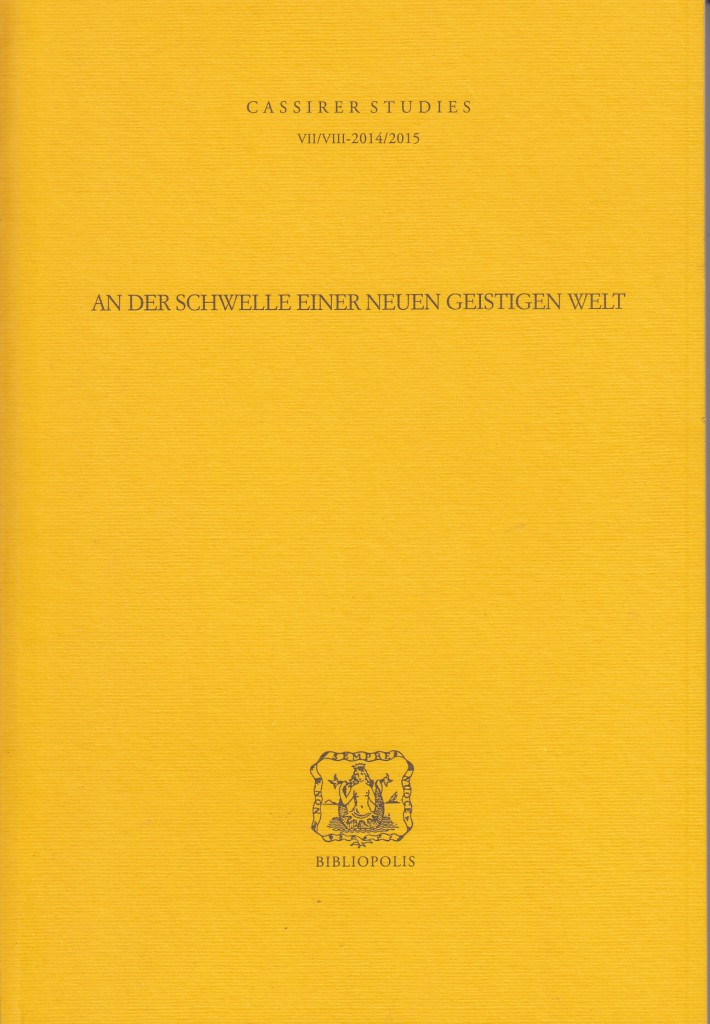ABSTRACTS: Cassirer Studies (VII-VIII/2014/2015)
Tuesday, October 20th, 2020PIERRE KELLER, Kant’s “Proud Name of Ontology” Between Cassirer’s Philosophy of Symbolic Forms and Heidegger’s Being and Time
Cassirer anticipates Heidegger’s question of being in its unity and in its diversity. The connection between the unity and diversity of being is crucial to the pluralism that both Cassirer and Heidegger inherit from Kant. Cassirer anticipates Heidegger’s conception of dwelling as being-in-the-world and can effectively rebut Heidegger’s charge that he and Kant work with a worldless epistemic subject. Dwelling is key to the natural concept of the world, but not for Cassirer key to understanding being itself. Pure being is manifest in the being of the copula as an expression of what Kant calls pure apperception. Heidegger takes event to be that through which everything comes into its own proper significance in our dwelling as being-in-the-world. The process by which Cassirer’s seemingly much more abstract pure being as functional-sequential unity institutes significance betrays their common origin in Kant’s apperception of our world from within the world.
Keywords: Cassirer – Heidegger – ontology – temporality – Ereignis
SEBASTIAN LUFT, Cohen’s Idea of a Philosophy of Culture and the Question of the Human Subject
The paper treats the human subject in the context of Cohen’s philosophy of culture. In addition to his Logic of Pure Cognition, Ethics of Pure Willing and Aesthetics of Pure Feeling, Cohen’s planned System of Philosophy was to be completed by a fourth volume, intended to be a Psychology and to deal with the “unity of cultural consciousness” (Einheit of Kulturbewusstein). His Ethics – in the Introduction and the final chapter 16 “Humanity” – contain some interesting remarks and passages on the nature of the human subject, testifying to Cohen’s peculiar treatment of the individual. The key term for his consideration of the human being is thus the “unity of cultural consciousness”, the unity of human being and culture, the alleged unity of theory of consciousness and theory of culture. Ethics itself «as the doctrine of the human being» is the «doctrine of the concept of the human being».
Keywords: Hermann Cohen – neo-kantianism – ethics – philosophical anthropology
LYDIA PATTON, Cassirer and Steinthal on Expression and the Science of Language
Ernst Cassirer distinguished between the expressive and representative forms of thought and language, one reason Cassirer is read as a mediator between Heidegger and Carnap. This essay finds a source of Cassirer’s expressive function in Heymann Steinthal’s 1871 work Abriss der Sprachwissenschaft, one thesis of which is that language, «independently of logic, establishes its forms in complete autonomy». While the thesis appears to be in conflict with Carnap’s later views on the «language of science», I urge that we should not draw that conclusion too hastily. Cassirer’s and Steinthal’s positions are consistent with the claim that once linguistic forms are established they can be represented in an inferential system. Instead, Cassirer and Steinthal wanted to emphasize, against Humboldt and Mill, that the expressive form of any one natural language shouldn’t be identified with the capacity for rational thought.
Keywords: Cassirer – Carnap – Steinthal – language – logic
SIMON TRUWANT, Cassirer’s Enlightened View on the Hierarchy of the Symbolic Forms and the Task of Philosophy
This paper aims to clarify an apparent inconsistency in Cassirer’s view on the relation between the different domains of human culture. On the one hand, Cassirer insists that there is no shared criterion by means of which we could establish a hierarchy among these domains. Yet, on the other hand he also holds that mythical thought needs to be overcome, while calling language the most important, and science the highest attainment of culture. In order to reconcile these claims, I first demonstrate that Cassirer’s relativistic and hierarchical accounts of the symbolic forms originate in his respective transcendental and critical views of human culture. While the former perspective explains our generically distinct worldviews, the latter discerns a progressive self-understanding of symbolic consciousness. Next, I argue that these perspectives complement each other in so far as they both promote an Enlightened conception of human culture and an ethical view on he task of philosophy.
Keywords: hierarchy of cultural domains – critical-transcendental philosophy – self-understanding – enlightenment
